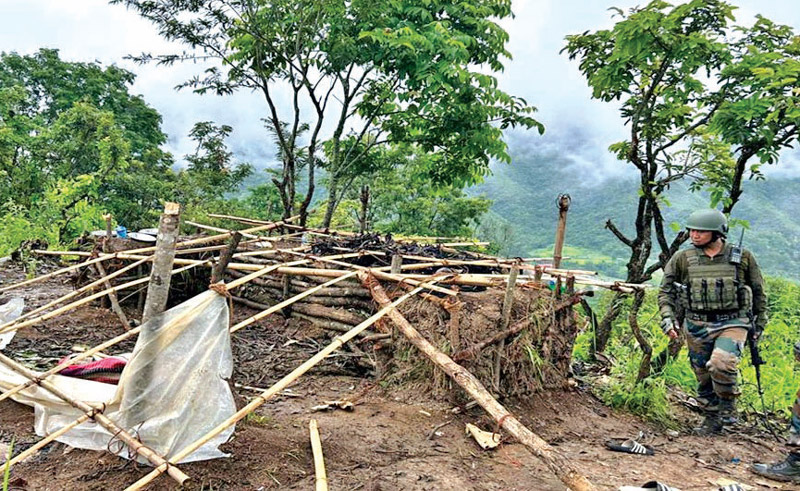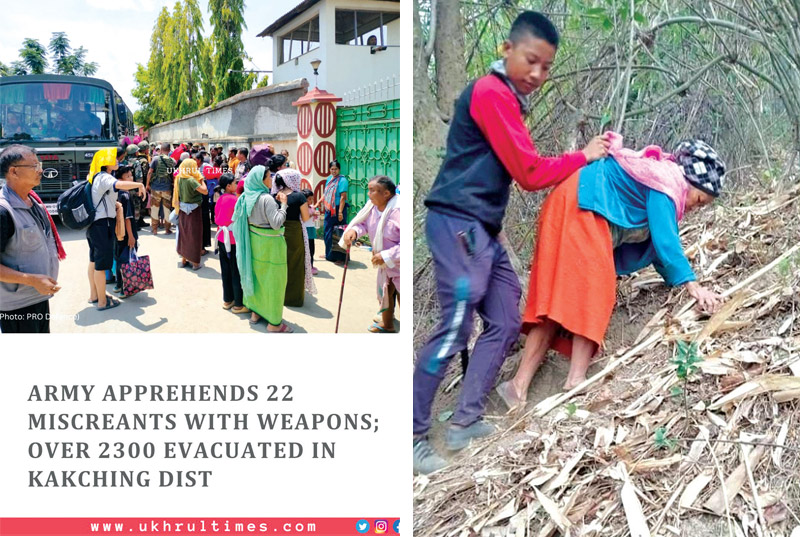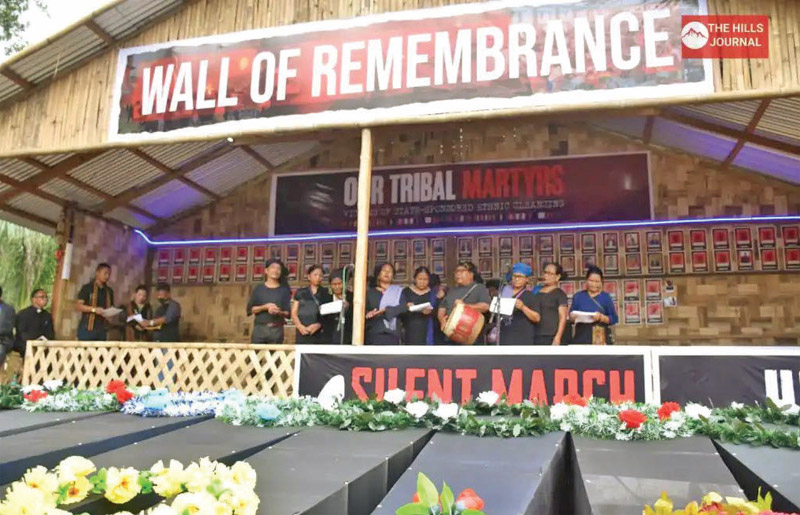Deep wounds between Kukis and Meiteis will take at least two generations to heal
Mohammad Asif Khan
“Without the consent of the state, no riot in India can last for more than 24 hours,” retired IPS officer Vibhuti Rai famously remarked in an interview with Teesta Setalvad for her magazine Communalism Combat. It has been three months since the ethnic violence between the majority Meitei community and the minority Kuki tribes began in Manipur, yet there are no signs of it abating.

The violent clashes have resulted in a devastating death toll, with at least 145 confirmed fatalities, according to conservative estimates by the authorities. Even with the presence of the army, the clashes persist, leaving isolated villages engulfed in gunfire. Cities have been transformed into ghost towns, their buildings and churches burnt and destroyed, and their tin roofs melted and twisted by the intense heat. Desolate streets are now lined with these haunting remnants.
The eviction of Kuki villagers from reserve forest land earlier this year set the stage for protests and agitations, exacerbating existing grievances. These tensions reached a boiling point when a tribal solidarity march to protest against the Meitei community’s demand for Scheduled Tribe (ST) status, escalated into violence, resulting in the loss of at least 54 lives. The Kukis have their own demand for a separate administration.
After nearly almost three months, and with mounting pressure fuelled by a viral video depicting three Kuki women stripped naked and paraded by a large mob of Meitei men, the Prime Minister finally broke his months-long silence on the ongoing violence in Manipur. The disturbing incident drew widespread attention and brought urgency to the need for addressing the crisis in the northeastern state. His response is a stark reminder of New Delhi’s ignorance of the northeastern states.
“They don’t take us seriously enough because we do not pose much threat to the political equation in Delhi,” says Thangminlen Kipgen, the spokesperson of the Kuki Inpi Manipur, which describes itself as the apex body of the Kuki tribes.
Opposition parties and civil rights groups have called for President’s rule in Manipur amidst the continuing violence. The opposition called for a debate on Manipur, which was accepted by the government, but the government claims that the opposition is creating too much ruckus in parliament for the debate to go through.
Netta D’souza, the president of All-India Mahila Congress Committee, who was on a three-day visit to Manipur, said “it is the lack of political will on the part of the BJP to have a debate on Manipur, do they not realise that they have a government in Manipur? Do they not realise the carnage and arson that is going on in Manipur, what have they done to ensure peace in Manipur? Nothing.”
“I think after going to Manipur, I am a different person, the plight of the people living in refugee camps has terrified me” she added.
The opposition later called for a no-confidence motion in parliament to highlight and question the Modi government in handling the Manipur crisis, which was accepted by the speaker.

International Condemnation
In response to the Manipur violence, the United Nations High Commissioner for Human Rights, Volker Türk, called on the Indian government to swiftly address the situation, which includes conducting a thorough investigation and addressing the root causes of the violence following their international human rights obligations.
The US Ambassador to India, Eric Garcetti, offered the United States’ help to India for resolving the situation in Manipur.
Shortly before Prime Minister Narendra Modi arrived in Paris on a state visit, the European Parliament (EP) called on the Indian government to act “promptly” to halt the violence in Manipur and protect religious minorities.
The European Union adopted a resolution on Manipur, which India’s Ministry of External Affairs called a “colonial mindset” and an “interference in India’s internal affairs,” thereby rejecting participation in the European Parliament’s plan to hold an “urgent debate” on Manipur.
Concerns about Manipur were also raised by Fiona Bruce, a United Kingdom MP who acts as UK Prime Minister Rishi Sunak’s special ambassador for freedom of religion or belief (FROB). During a session in the House of Commons’ main chamber, Bruce expressed concern over the rising violence in Manipur.
A group comprising 15 Manipur organisations has submitted a memorandum to the United Nations and international human rights bodies, urging them to bring global attention to the ongoing crisis in the northeastern state.
International human rights organisations like the Amnesty International and Human Rights Watch have condemned the violence and have called for investigation of alleged police bias.
Ethnic Divide
The violence in Manipur is serving as a bleak reminder of how the Indian state has not been able to contain ethnic violence for over three months now. Security units like the Assam Rifles and the Manipur Police have been accused of being complicit in the violence and taking sides on ethnic lines.
“We were given to them by the police,” said one of the Kuki women who was paraded naked and sexually assaulted on the streets by a group of men belonging to the Meitei community.
The incident happened on May 4 and a complaint of gang rape was filed on May 18. The victim said she and her family were not aware of the existence of a video capturing the incident, the circulation of which has sparked national outrage and prompted the state government and the police to take action, two months after the FIR was filed. “There is no internet here in Manipur, we wouldn’t know,” she told The Indian Express.
The shocking sexual assault took more than two months to come to light, mainly due to the internet shutdown in the region. As a result, a significant portion of the Indian population remains unaware of the gravity of the violence in Manipur. The authorities argue that shutting down the internet is necessary to prevent the spread of fake news and incidents of violence that could exacerbate the situation. However, it was indeed fake news that contributed to the violence against women in the state. Internet shutdowns fail to address this issue effectively.
A Manipuri youth associated with the Manipur Tribal Forum in Delhi, who does not wish to be named, told the Force: “In today’s times, the internet is integral to our daily lives. Deprivation of this would mean deprivation of information, facts and figures and knowledge.”
During these violent incidents, more than 1,500 Meitei and Kuki policemen mysteriously disappeared in early May, according to police sources. They reappeared at police stations near their homes after a few days. As a consequence of this situation, the Kuki officers assigned to the Meitei-dominated Imphal Valley moved to the hills. In contrast, Meitei officers stationed in Kuki areas refused to return, further exacerbating the divide. A significant number of officers took leave, and presently, more than 50 officers are still unaccounted for. Additionally, many of them were reposted to stations closer to their homes according to a report published in The Print.
Complaints from the Kuki community about their villages being burnt in the valley were reportedly not registered in Imphal, where the Meiteis have a dominant presence in the police stations. Likewise, cases filed by Meiteis concerning losses in Kuki-dominated areas were allegedly not addressed there according to the same report.
Combing operations on both sides have failed, allegedly because policemen alert villagers in advance. The consequences of this division have had a notable impact on the handling of cases related to the violence.
Col Rajinder Kushwaha (Retd), a former commanding officer of 3 Bihar, emphasised that the effectiveness of security forces “is directly proportional to liberty and freedom they enjoy to carry out their operations. If you tie their hands at the back, you cannot expect optimum results.” He said “security forces are only an instrument of first aid, they cannot provide solutions to a political problem.”

“The resolution of the conflict ultimately rests on addressing the underlying grievances of the people through political dialogue and solutions,” he asserted.
A key point of concern revolves around the Armed Forces Special Powers Act (AFSPA). According to Col Kushwaha, “The removal of the AFSPA from Manipur has led to hesitancy among security forces to take decisive action when faced with rioters and militants. They have no personal interests. They need legal and judicial cover to exempt them from inadvertent mistakes,” Col Kushwaha told Force.
The AFSPA has faced widespread opposition from local communities in Manipur, who see it as a tool of repression and abuse of power by security forces. Protests and demands for its repeal have been ongoing for many years, with activists and organisations advocating for a more balanced and human rights-oriented approach to dealing with security challenges. However, the Indian government has argued that the AFSPA is necessary to empower security forces to effectively deal with insurgency and maintain law and order in areas affected by armed conflict.
Incidents of police brutality have gone unnoticed, In one such incident a Kuki youth who was arrested for sharing a post on chief minister N Biren Singh was being taken from court to jail on May 4 when a mob of around 800 men and women intercepted the police vehicle, dragged him out and beat him to death.
“Any credible voice that objectively assesses the present violence and complicity of the state is either silenced or ostracised,” the youth from the Manipur Tribal Forum said.
Unaccounted Rapes
Both sides have been accused of using rape as a tool of revenge against the other community. A piece of fake news circulating on social media alleging the rape of a Meitei woman triggered a violent retaliation wherein three Kuki women were sexually assaulted and paraded naked by a Meitei mob.
The horrifying video that got leaked nearly three months after the Incident took place brought to light the level of rapes happening in Manipur. It was not an isolated incident. As the chief minister recently admitted on national television, there are “hundreds of rapes” that have already taken place.
Netta D’Souza said: “Women have become soft targets in this conflict and they are the ones who have been most affected. The government must ensure the safety of every woman in the state,” she added.
Manipur has a long history of women playing a prominent role in civil society, including the Meira Paibis, who have campaigned against abuse of power by the state and the army.
However, their roles have reversed in the ongoing conflict with members of the group having allegedly called for violence against the Kuki community.
Buffer Zones
The security forces have now demarcated lines on either side of their new posts, ranging from a few hundred meters to even a kilometre depending on the proximity of villages, which the Meitei and Kuki populations are not allowed to cross. These buffer zone act like a ‘Maginot Line,’ between the hills and the valley to physically segregate the two ethnic groups to decrease violence.
However, this approach of suppressing violence through physical separation has proved to be counterproductive. Instead of fostering peacebuilding and political reconciliation, it risks exacerbating tensions by creating community divisions. Burning bridges between these groups rather than building them only makes the path to peace and understanding even more distant and challenging.
Troubled History
One of the critical flashpoints in the Meitei-Kuki conflict centres around land ownership and territorial disputes. “There are several issues which have arisen relating to land,” explained Nandita Haksar, a renowned human rights lawyer, teacher, campaigner and writer. Eviction of Kukis from lands designated as reserved forests, displacement from poppy-growing areas, and the mounting population pressures contributed to the conflict, she said.
Haksar cautioned against simplifying this multifaceted conflict as a mere product of historical grievances. “The historical reasons may explain some of the factors for the tensions between these communities; they cannot explain what is happening now,” she said. In a region where contemporary politics and ever-changing landscapes play a pivotal role, a nuanced perspective becomes indispensable.
Delving deeper into the demographic shifts, Haksar noted, “The rise in population is due to migrants, including Nepalis, the influx of refugees from Myanmar after the February 2021 military coup in that country, and pressure from transnational corporations looking to grab the land.” This interplay of migration and territorial ambitions weaves a tangled web, driving communities further apart.
The history of insurgencies in the region has also left an indelible mark on the Meitei-Kuki conflict. Haksar pointed out that “the first insurgency which had an impact on Manipur was the Naga insurgency,” referring to the demand for integration of Naga-inhabited areas into a sovereign state. The ripple effect of this movement has inspired various Meitei and Kuki/ Zomi armed groups, adding a layer of complexity to an already intricate tapestry of conflicts.
While historical aspirations may influence the ideologies of these insurgent groups, identity politics rooted in race and religion often take centre stage. “The Meitei insurgency and demand for an independent Manipur is inspired by the history of the old Manipur Kingdom,” Haksar said. In the backdrop of political ambitions, genuine grievances may be overshadowed, intensifying the cycle of violence.
Drug Trade
The significant disparity in infrastructure development between the hills and valley districts has become a major source of concern, leading to contestation and discontent among different ethnic groups in Manipur. The valley districts enjoy a much higher level of development across key indicators, such as roadways, power, medical, educational institutions, telecom services, and airways are predominantly located in the Imphal Valley, making it challenging for tribal communities to access these facilities.
“We want to be a part of the development, we want our children to attend the best of schools in the state so it became necessary for us to buy land and settle down in Imphal and other valley areas,” Kipgen told the FORCE.
Manipur holds crucial importance as India’s gateway to the East, with Moreh serving as a critical entry point. Asian Highway 1 enters India at Moreh from Tamu via Mandalay in Myanmar, connecting Tokyo to Turkey and genuinely integrating the continent.
Under Biren Singh, a Meitei, the BJP-led government of Manipur has initiated a controversial ‘war on drugs’ campaign to tackle poppy cultivation. Since 2017, the government claims to have destroyed over 18,000 acres of poppy fields, primarily located in Kuki-inhabited areas.
Manipur faces a drug addiction crisis, being among four northeastern states bordering Myanmar, the world’s second-largest opium producer.
Biren Singh has been criticised for openly taking sides. One Twitter user, Thang Kuki, commented on Singh’s post, ‘You should have resigned a long time ago.’ To this, Biren Singh replied: ‘Are you from India or Myanmar?’
Calls for Biren Singh’s resignation have been voiced by the opposition as well as within the BJP. In a high-edged political drama, Biren Singh drafted his resignation and set out to submit his resignation to the governor but was stopped mid-way by his supporters, who urged him not to resign. He later announced that he would not be stepping down at this ‘crucial juncture’.
Calls for Peace
Taking suo moto action after the video of the women being paraded naked came to light, the Supreme Court asked the government to act while Opposition groups led by the Congress have asked for a debate in parliament and have demanded a statement from Prime Minister Narendra Modi. Civil rights activist Irom Sharmila urged Modi to immediately intervene to address the situation in her home State.
Kipgen feels the worst affected are the children as “such kinds of wounds normally take at least two generations to heal, the seeds of hatred have been sown.”
There are fears that the conflict might spill over to other neighbouring states, which are also volatile. On July 22, Meitei individuals residing and employed in Mizoram began leaving the state in response to a directive issued by the Peace Accord MNF Returnees’ Association (PAMRA) asking Meiteis to leave for their own safety. Chances of a long-lasting peace between the two communities seems far-fetched for now.

